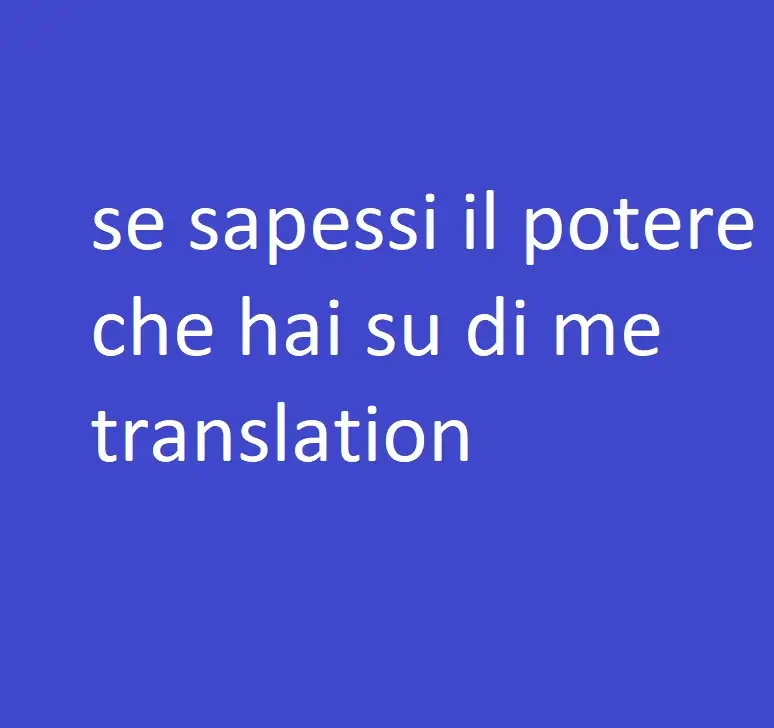The phrase "se sapessi il potere che hai su di me" whispers of deep emotional vulnerability and unspoken influence. For those encountering this Italian expression, the immediate question is, "What does it truly mean, and how can it be accurately translated?" This article aims to provide a comprehensive exploration of this phrase, delving into its linguistic nuances, emotional implications, and cultural context, while addressing the search intent of those seeking a clear and insightful understanding.
Understanding the Core Meaning: "If You Knew the Power You Have Over Me"

At its most literal level, "se sapessi il potere che hai su di me" translates to "if you knew the power you have over me." However, this simple translation only scratches the surface. The phrase carries a weight of unspoken feelings, suggesting a profound impact one person has on another. It implies:
- Emotional Dependency: The speaker acknowledges a vulnerability, revealing that their emotions are significantly influenced by the other person.
- Unconscious Influence: The other person may be unaware of the extent of their impact.
- Hidden Feelings: The phrase hints at emotions that are not openly expressed, perhaps due to shyness, fear, or uncertainty.
- Romantic or Deeply Platonic Context: While often associated with romantic feelings, the phrase can also apply to intense friendships or familial bonds.
Dissecting the Phrase: A Linguistic Breakdown
To fully grasp the meaning, let's break down the components:
- "Se": This is the Italian word for "if," introducing a conditional clause. It sets up a hypothetical scenario, suggesting that the speaker is contemplating a situation that may or may not exist.
- "Sapessi": This is the imperfect subjunctive of the verb "sapere" (to know). The subjunctive mood is crucial, as it indicates uncertainty and subjectivity. It conveys a sense of "if only you knew."
- "Il potere": This translates to "the power." It emphasizes the significant influence the other person wields.
- "Che hai": This means "that you have." It directly attributes the power to the other person.
- "Su di me": This translates to "over me." It specifies the target of the power, highlighting the speaker's vulnerability.
Contextual Nuances and Emotional Depth
The beauty of "se sapessi il potere che hai su di me" lies in its ambiguity. The specific emotion conveyed depends heavily on the context. It can express:
- Romantic Longing: A deep, unspoken attraction, where the speaker is overwhelmed by their feelings.
- Admiration and Respect: A profound appreciation for someone's qualities, where their presence is a source of inspiration.
- Emotional Vulnerability: A sense of being emotionally exposed, where the other person's actions have a significant impact.
- Frustration and Resentment: In some cases, it can express a feeling of being controlled or manipulated.
Accurate Translation and Interpretation
While "if you knew the power you have over me" is the most literal translation, alternative interpretations can capture the emotional depth more effectively:
- "If only you knew how much you affect me."
- "You have such a hold over me, if you only knew."
- "If you understood the influence you have on my feelings."
- "If you realized the strength of your effect on me."
- "You have an unseen power over my emotions."
Choosing the best translation depends on the specific context and the desired emotional tone.
Cultural Context: Italian Romanticism and Emotional Expression
Italian culture is known for its passionate expression of emotions. This phrase reflects that cultural tendency to embrace vulnerability and acknowledge the power of human connection. Italian literature and music are replete with expressions of longing, desire, and emotional intensity.
The emphasis on "potere" (power) in this context is not necessarily about dominance or control, but rather about the profound influence one person can have on another's emotional state. It speaks to the Italian appreciation for emotional depth and the acknowledgement of vulnerability as a strength.
The Importance of Experience and Expertise in Interpretation
Understanding the nuances of "se sapessi il potere che hai su di me" requires more than just a literal translation. It requires:
- Linguistic Expertise: A deep understanding of Italian grammar, syntax, and idiomatic expressions.
- Cultural Competence: Awareness of Italian cultural values and emotional expression.
- Emotional Intelligence: The ability to interpret the emotional undertones of the phrase.
- Contextual Awareness: The ability to consider the specific situation in which the phrase is used.
Someone who has lived in Italy, studied Italian literature, or has a deep understanding of Italian culture is better equipped to interpret the phrase accurately.
Conclusion: The Enduring Power of Unspoken Emotions
"Se sapessi il potere che hai su di me" is more than just a phrase; it's a window into the complex world of human emotions. It encapsulates the vulnerability, longing, and unspoken feelings that often accompany deep connections. By understanding its linguistic nuances, cultural context, and emotional implications, we can appreciate the enduring power of this evocative expression.